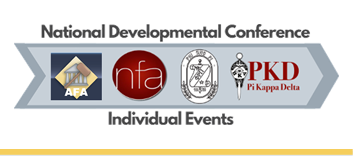Document Type
Administrative Support/Publicity
Abstract
This paper offers three recommendations bearing on the general topic of administrative support and publicity. First, I urge the collection and dissemination of information about funding levels, activity levels, and instructional demands in forensics. This information would provide an important data base for directors of forensics who bear the primary responsibility for securing sup port for their forensics program and negotiating expectations that influence outside assessments of program quality and instructional performance. Second, a call for increased attention to non-competitive public service programs as a means of enhancing program visibility and reaffirming a commitment to speech as a means for public discussion and decision making is issued. Finally. greater focus on training undergraduate students interested in teaching speech activities is encouraged as a means of cultivating a supportive relationship between collegiate programs and high school forensics.
This paper examines the general topic are.a of administrative support and publicity by offering recommendations in two areas. In creating a climate of support, I suggest that program directors need information which would allow them to make a specific and persuasive case concerning what constitutes an "appropriate" level of institutional support for the activity. Adequate data about the funding, staffing, and activity levels that prevail in the forensics community would allow a more accurate assessment of what level of achievement and visibility a program might be expected to achieve given a specific level of support. I examine the issue of funding and staffing individual events programs and recommend that supportive information be made more readily available to forensics directors charged with the responsibility of negotiating on behalf of themselves and the programs they direct. Secondly, I suggest that a serious commitment to the non-competitive aspects of forensics is a means of enhancing program status, visibility, and service. Initially, the relationship of college forensics programs to campus and community is explored and greater emphasis on non-competitive public events as a means of campus and community service is encouraged. Finally, I suggest that collegiate forensics cultivate a more supportive role relative IO high school programs through undergraduate level training in forensics administration.
Creative Commons License

This work is licensed under a Creative Commons Attribution 4.0 International License.
Rights Statement
In Copyright https://rightsstatements.org/page/InC/1.0/?language=en
Recommended Citation
Underberg, Larry
(1989)
"Creating a Climate of Support for Forensics Programs,"
Proceedings of the National Developmental Conference on Individual Events: Vol. 1:
Iss.
1, Article 36.
Available at:
https://cornerstone.lib.mnsu.edu/ndcieproceedings/vol1/iss1/36

